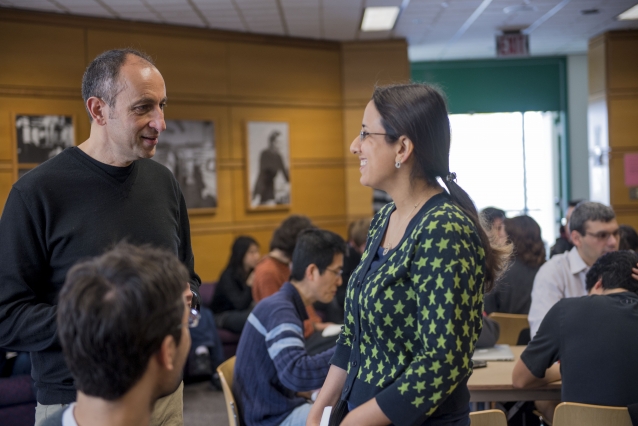
Munther Dahleh, now director of MIT's Institute for Data, Systems, and Society, speaks with postdoc Rose Faghih at a Postdoc6 workshop. Photo: Patricia Sampson
EECS is MIT’s largest department — so it should come as no surprise that it’s home to a massive postdoc community as well.
Dozens of postdoctoral associates work in the four EECS labs: Computer Science and Artificial Intelligence Laboratory (CSAIL), the Laboratory for Information and Decision Systems (LIDS), the Microsystems Technology Laboratories (MTL), and the Research Laboratory of Electronics (RLE). EECS’s Postdoc6 initiative helps unite this widely dispersed community for peer networking and skills training.
“Postdocs come to MIT in what is perhaps the most stressful period in their careers,” notes Nir Shavit, professor of electrical engineering and computer science and Postdoc6 faculty coordinator. “They have a relatively short period of time to show that they can engage in novel research, typically different from what they did in their PhDs, and at the same time apply for jobs.”
One popular Postdoc6 offering is the EECS Leadership Workshop for Postdocs, a two-day offsite event offered several times a year for groups of 16 postdocs. The workshops, held at MIT’s Endicott House conference center in Dedham, Mass., offer presentations and interactive sessions tailored to postdocs interested in both academic and nonacademic careers.
Workshop attendees actively participate in sessions on leadership, collaboration, group dynamics, effective communication, and organizational skills such as setting goals and priorities. Facilitators use improvisational-theater techniques as part of that training, creating a microcosm of what happens in the lab. They also establish follow-up peer groups to provide postdocs with supportive networks that last long after each workshop ends.
“Key to these workshops is the ability to take the postdocs out of their busy everyday lives and allow them an interruption-free environment in which they can reflect on their needs going forward as future scientists and leaders,” Shavit says.
Postdoc feedback has been overwhelmingly positive. Typical was the comment from one recent attendee, who described the intensive workshop as a “very useful and productive experience,” adding: “The material can be applied immediately.”
For more on the Postdoc 6 initiative, see these features from 2015 and 2016.
Date Posted:
Labs:
Card Title Color:
Card Description:
Photo:
